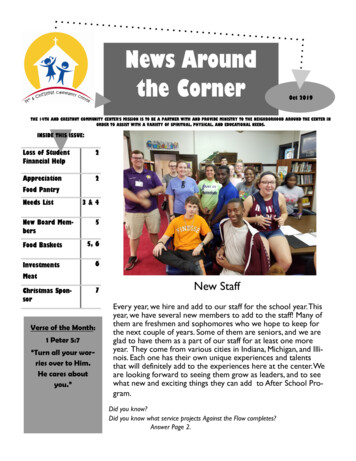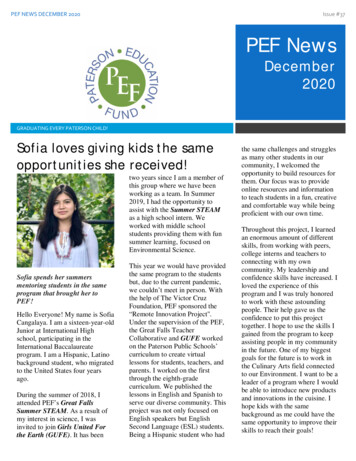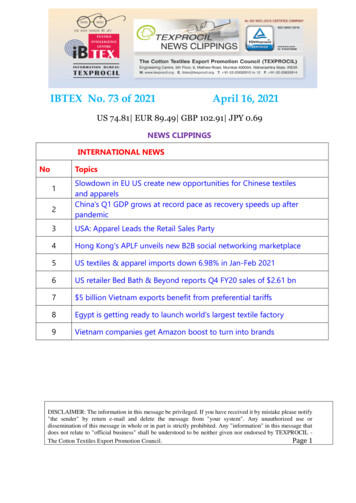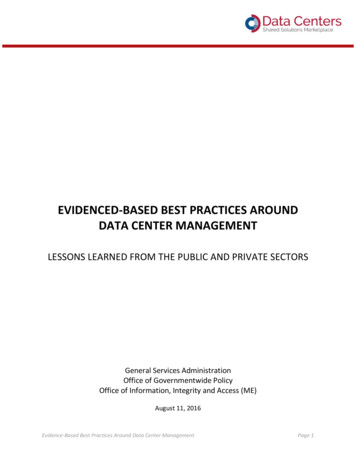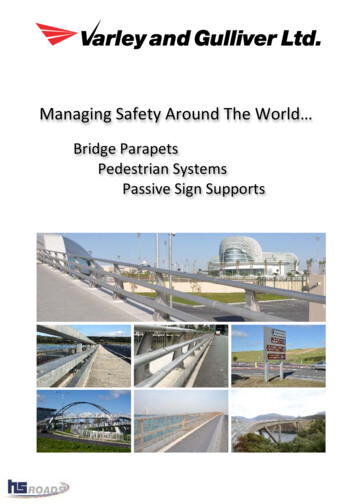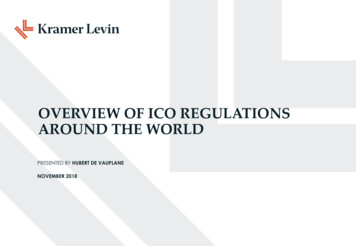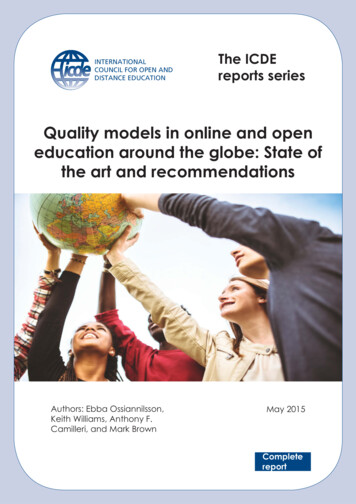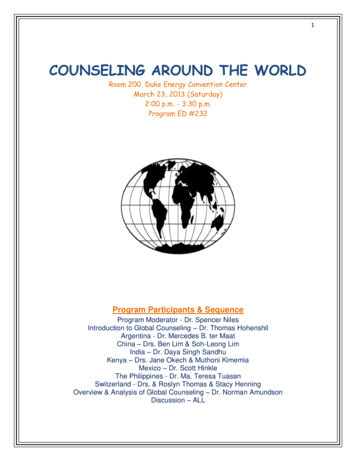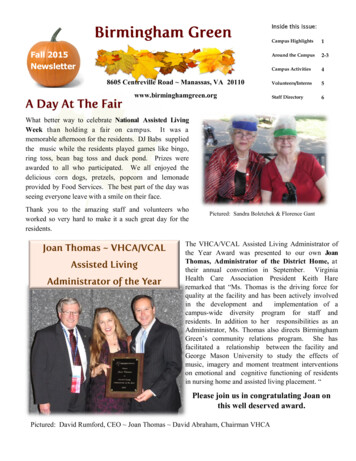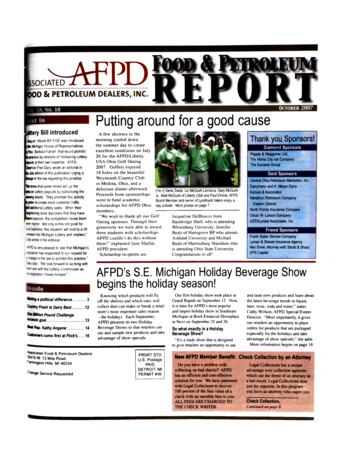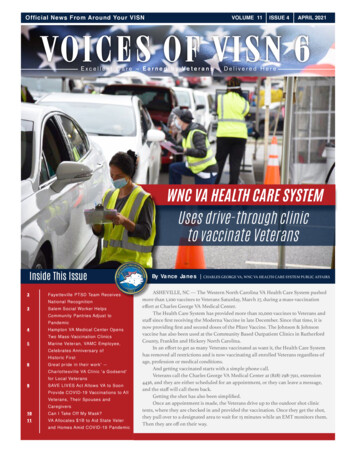
Transcription
Official News From Around Your VISNVOLUME 11ISSUE 4APRIL 2021V OICE S OF VISN 6E x c e l l e n t C a r e – E a r n e d b y V e t e r a n s – D e l i v e r e d H e r eWNC VA HEALTH CARE SYSTEMUses drive-through clinicto vaccinate VeteransInside This Issue3Fayetteville PTSD Team Receives3Salem Social Worker HelpsNational RecognitionCommunity Pantries Adjust toPandemic4Hampton VA Medical Center OpensTwo Mass-Vaccination Clinics5Marine Veteran, VAMC Employee,Celebrates Anniversary ofHistoric First6Great pride in their work’ —Charlottesville VA Clinic ‘a Godsend’for Local Veterans9SAVE LIVES Act Allows VA to SoonProvide COVID-19 Vaccinations to AllVeterans, Their Spouses andCaregivers10Can I Take Off My Mask?11VA Allocates 1B to Aid State Veterand Homes Amid COVID-19 PandemicE x c e l l e n t C a r e – E a r n e d b y V e t e r a n s – D e l i v e r e d H e r eBy Vance Janes CHARLES GEORGE VA, WNC VA HEALTH CARE SYSTEM PUBLIC AFFAIRSASHEVILLE, NC — The Western North Carolina VA Health Care System pushedmore than 1,100 vaccines to Veterans Saturday, March 27, during a mass-vaccinationeffort at Charles George VA Medical Center.The Health Care System has provided more than 10,000 vaccines to Veterans andstaff since first receiving the Moderna Vaccine in late December. Since that time, it isnow providing first and second doses of the Pfizer Vaccine. The Johnson & Johnsonvaccine has also been used at the Community Based Outpatient Clinics in RutherfordCounty, Franklin and Hickory North Carolina.In an effort to get as many Veterans vaccinated as want it, the Health Care Systemhas removed all restrictions and is now vaccinating all enrolled Veterans regardless ofage, profession or medical conditions.And getting vaccinated starts with a simple phone call.Veterans call the Charles George VA Medical Center at (828) 298-7911, extension4436, and they are either scheduled for an appointment, or they can leave a message,and the staff will call them back.Getting the shot has also been simplified.Once an appointment is made, the Veterans drive up to the outdoor shot clinictents, where they are checked in and provided the vaccination. Once they get the shot,they pull over to a designated area to wait for 15 minutes while an EMT monitors them.Then they are off on their way. APRIL 2021//////////////////////////////////1
MESSAGE FROM OUR ACTING NETWORK DIRECTORNot so long ago, VA questioned whether Veterans were receiving the care theyneeded when and where they needed it. Inthe last year, VA has demonstrated superiorproficiency in how quickly its excellent careis delivered.We’ve shown that VA can turn on adime. A year ago, we created a new lexiconand developed new guidelines and protocols for people that immediately went intoeffect; mind you, the coronavirus pandemicwas in its American infancy. We quicklyadapted to new rules, restrictions, procedures, repurposed spaces, virtual appoints,etc. Intrepid clinical practitioners andresearchers found room in their workspaces to try new things and apply what theyknew to what they didn’t know. Innovationflourished. It had to. We found ways torestrict access but keep things moving.We redefined priorities but continuedto serve successfully. We have managed tomove forward and reopen some spaces, enabling more personal, in-person visits. Andwe have coped with the physical restructuring necessary to take care of our mostserious patient conditions while simultaneously battling COVID and sending recovered Veterans back home to their families.Our transition to vaccination was epic. Todate, we have vaccinated more than 225,000Veterans, growing every day. Now, with theStrengthening and Amplifying VaccinationEfforts to Locally Immunize All Veteransand Every Spouse Act, known as the SAVELIVES Act, VA is moving the bar again.As many of you already know, theSAVE LIVES Act allows VA to soon provideCOVID-19 vaccinations to all Veterans,their spouses, and caregivers. The Actincreases the number of people eligibleto receive a vaccine through VA from 9.5to 33 million, prompting VA SecretaryMcDonough to advise, “Meeting the taskof vaccinating this expanded populationwill be a tremendous undertaking for theVA and will require a significant increase inour allocation of vaccine supply, but I amconfident that VA’s workforce is up to thetask.” Yet, we have already begun doing it.Within days of President Biden’s signatureon the bill, VHA had instructions and aprocess to carry out the unprecedentedmandate.We are prepared to process as manyas we can in the easiest way possible foreveryone. Our staff are agile and resilient.We are superior performers. We turn everychallenge into an opportunity. So, beginning with Asheville on March 27, we beganadministering vaccine doses to spouses,caregivers, and Veterans who otherwisemay not have received the VA vaccine.All of our facilities have amended theirprotocols and adjusted practices, so we areprepared to vaccinate everyone we can.Stephanie Young Acting VA Mid Atlantic Health Care Network Director, VISN 62\\\\\\\\\\\\\\\\\\\\\\\\\\\\\\\\\APRIL 2021 E x c e l l e n t C a r e – E a r n e d b y V e t e r a n s – D e l i v e r e d H e r e
Fayetteville PTSD Team ReceivesNational RecognitionA VA health care team from Southeastern North Carolina recently received national kudos for work they do to help Veterans heal. The Fayetteville PTSD clinic, throughthe leadership of Dr. Jeff Jones, was recognized by the National Center for PTSD Mentoring Program for their progress and improvements.Dr. Jones attributes the cause for attention, “Most importantly, [to] the TraumaSpecialty Program (TSP) team members’ commitment to increasing the use of evidence-based therapies since before the [Coronavirus] pandemic began.” While thatmay be true, the humble leader was singled out in a statement by the program for hisinspirational direction. “We clearly recognized his commitment to the mission of PTSDspecialty care and commitment to ongoing process improvements.”Dr. Jones points to the team’s dedication and its opportunity to optimize newlyavailable technologies, like VA Video Connect (VVC) to strengthen team members’cohesion and to more completely engage Veterans during the COVID-19 era. “When theclinic went all-remote early during the pandemic, we supported one another throughvirtual treatmentteam meetings,”Jones said. Theteam also reliedon researchsuggesting thatevidence-basedtherapies can beeffectively delivered remotely.The teamembraced theopportunity,capitalizingon increasedavailability andauthoritativeguidance toexpand VVC use.The Fayetteville PTSD team is: Pictured (top to bottom, l-r): Shondell Hawkins,LCSW, Dr. Elliott Fitzpatrick, Shelia Leese-Roberts, LCSW, Natasha DickenDr. Jones said theson, MSA, Omar Nichols, PSS, Dr. Susan Sheu, Dr. Jeffrey Jones, Heatherteam could offerHennessey, PSS. Not Pictured: Dr. Shavern Browne, Dr. Kailey Carlson, Dr.evidence-basedRebecca Gellmanpsychotherapiesto motivated Veterans at remote locations where in-person appointments previouslymay have been a challenge.The mentoring program staff added that, “The steady work of your PTSD teamhas resulted in clear improvements in the percentage of your Veterans with PTSD whoengaged evidence-based and measurement-based care.”Fayetteville Executive Director Dan Dücker, among many VISN leaders chiming inwith congratulations, excitedly greeted the team, encouraging them to “keep doing whatyou do,” noting the growth in service reflected in steady gains for each of the six lastquarters. The mentoring program staff concluded, noting “We recognize the countlessadditional stressors and burdens that the field is experiencing [due to the COVID-19epidemic], which makes your accomplishments all the more impressive.”Dr. Jones says that there are opportunities they have learned that will be availableon which to capitalize after the pandemic breaks. “We anticipate the importance ofmaintaining a strong ability to continue to offer VVC-based therapies even after pandemic restrictions lift,” he says, which he believes should enable them to continue theperformance and growth.E x c e l l e n t C a r e – E a r n e d b y V e t e r a n s – D e l i v e r e d H e r e APRIL 2021Salem Social WorkerHelps Community PantriesAdjust to PandemicBy Rosaire BusheySALEM VA MEDICAL CENTER PUBLIC AFFAIRSHomelessness and food insecurity are not Veteran-specific issues, so working together with thelocal community provides social workers like Jeremy Floyd, the Housing Urban Development-Veterans Affairs Supportive Housing (HUDVASH) CaseManager, an opportunity to help Veterans who maybe in either or both of these categories.Floyd has been working with Feeding Southwest Virginia (FSV) to coordinate disaster-relieffood boxes, and because of the pandemic, thelast year has seen a shift in the way food pantriestypically operate. As Case Manager for HUDVASH,Floyd works both to assist with housing and foodinsecurity issues for Veterans throughout the area.“The food pantries have had to adjust theirdistribution process to keep up with the increasein demand and need for assistance as well as socialdistancing and COVID-19 precautions for safetyand this presents a challenge for homeless Veterans,” Floyd says. “Veterans and the general population had difficulty before navigating resources, butwith COVID-19, even more so now.”Floyd has been working with distribution sitesand engaging with FSV to set up boxes specifically for homeless Veterans. The collaboration hasworked to fill a vital food need throughout theonset of the pandemic.“The Blue Ridge Continuum of Care — theregion’s local planning group working to end homelessness — has seen a slight increase of inflow ofVeterans into the Roanoke area since the pandemicPHOTO ABOVE: HUDVASH Case Manager Jeremy Floyd hasbeen working to coordinate disaster-relief food boxes on behalfof Veterans who may be facing homelessness and/or foodinsecurity.CONTINUED ON PAGE 4//////////////////////////////////3
CONTINUED FROM PAGE 3Salem Social Worker Helps Community Pantries Adjust to Pandemicbegan,” he explains. “This increase has reallyled the whole community to work togethereven more to provide necessary resources.Grants in the local government and federal government, as well as Total Action forProgress — a community action agency thatserves 11 locations in the Roanoke Valley, havestepped in and are vital for offering assistance.”The funding from these sources helpsboth civilians and Veterans who have issuesranging from homelessness to risk of evictionor assistance with utilities.“They (TAP) have been a huge asset forus and the community,” Floyd says. “Thepandemic has resulted in job markets beingaffected which is a huge burden on the localemployment commission. A lot of peoplehave been forced to make tough choices,like paying for food or rent. A lot of peoplechoose food, as they wonder where their nextmeal will come from or how they will make itthrough the week.”Food insecurity is not a one-time event,but rather a weekly or monthly issue. Pre-pandemic people sought assistance at sites suchas food pantries, the Salvation Army, or faithbased providers. But the pandemic meantmore people were using these services andwhat normally would have been a 30-minutefood pantry visit sometimes turned into 3hours during peak influx.“We reached out to FSV and said, ‘Look,we haven’t seen this before. What can youoffer?’ Their response was amazing,” Floydsays. “They worked with us a for a couplemonths and helped with emergency packages.They had their suppliers who donated a lotof things and packaged for Veterans, and wetook some fleet vehicles and distributed thesepackages to Veterans on our caseload. Sincethen, FSV appears in the community with afood truck and hands out food packages.”To meet the challenge of providing aid ina pandemic, Floyd says the program followsprotocols that involve screening Veterans aswell as sanitation and cleaning for vehiclesand personal protective equipment for staff.“Some days you’re suited up like you’regoing into the OR,” Floyd says. “We havemasks, gloves, and face shields in the kitsfor Veterans and employee protection. It hasbeen a year now with these protocols, and it’sstarting to become second nature — it’s partof life now, and it’s odd if you don’t have someof these safety things in place, or if your glovesor mask isn’t on, you feel as if something ismissing or out of place.”Since the beginning of the pandemic,many agencies have adapted to the newnormal and have systems in place to distributeaid. But help is still needed.“Food pantries will always need peopleto volunteer with time or donations,” Floydsuggests. “Roanoke Area Ministries, FSV, andChristian Soldiers are local communities thathave places for donations, so people shouldcheck with their local communities to find outwhere and when donations can be accepted.”Hampton VA Medical Center Opens Two Mass-Vaccination ClinicsBy John RogersHAMPTON VA MEDICAL CENTER PUBLIC AFFAIRSIn addition to Hampton VA Medical Center’s on-site vaccination clinics, on March 8,2021, Hampton VAMC began giving COVID-19vaccinations (Janssen and Moderna) to Veterans at Hampton University’s ConvocationCenter. Moreover, on March 17, 2021, HamptonVAMC began administering COVID-19 vaccinations to Veterans at the Veterans of ForeignWars (VFW) facility in Norfolk, Virginia.“In addition to Moderna, HamptonVAMC is eager to be able to offer Janssen, athird highly effective vaccine to more Veterans,” said John Rogers, Public Affairs Officer.“This one-dose vaccine will help us reach ourultimate goal of offering COVID-19 vaccinations to all Veterans and employees whowant to be vaccinated.” In collaboration withHampton University and the Norfolk VFW,we can provide greater access to vaccines.Dr. Michelle Penn-Marshall, HamptonUniversity Vice President for Research, saidthe decision to provide support to HamptonVA Medical Center supports a priority ofboosting vaccinations, however possible.“As a Historically Black College and University we are trusted in the communities ofcolor, so that assists in minimizing hesitancy,”she said. “We are going to work with VA toensure that as many Veterans have the abilityto get vaccinated can do so at this ConvocationCenter,” Penn-Marshall said.Dr. Taquisa Simmons, Hampton VAMCExecutive Director said, “the Johnson & Johnson shot provides more flexibility for Veteranswho many do not have easy access to a secondvaccination appointment”. She also statedthat Hampton is here for the long haul andwe hope to get as many Veterans through oursystem as possible at these locations.In accordance with CDC guidelines,Hampton VAMC is currently offering vaccinations to enrolled Veterans 60 years of age andolder. Hampton VAMC is pleased to be ableto open things up and as things progress andsupply increases, we will be able to do more.RIGHT PHOTO: RN Joyce DeHaven goes over vaccination procedures prior to vaccinating a Veteran. LEFT PHOTO: Medical Support Assistants stand by to assist Veterans.(Photos by John Rogers, Public Affairs Officer)4\\\\\\\\\\\\\\\\\\\\\\\\\\\\\\\\\APRIL 2021 E x c e l l e n t C a r e – E a r n e d b y V e t e r a n s – D e l i v e r e d H e r e
Marine Veteran, VAMC Employee,Celebrates Anniversary of Historic FirstBy Rosaire Bushey SALEM VA MEDICAL CENTER PUBLIC AFFAIRSA year ago, March 28, 2020, Marine Veteran and Salem VA Medical Center Housekeeper Charles Roy Toler Jr., made history ina most unenviable way — he became the firstpatient admitted to the Salem VA MedicalCenter High Consequence Infection (HCI)unit for COVID-19.“I remember I had a cough that wouldn’tgo away, and I kept it for about two weeks,”Toler recalls. “I get headaches, and the coughing aggravated the headaches and I wanted itto go away, and my wife said, ‘You might haveCOVID,’ so I checked into the ER not thinkingI had it at all. I was just being a good soliderand doing what my wife told me to do.“They (the ER staff) took me right in andI started feeling sick in the ER,” he continues.“They put me in a special room and aboutthat time I felt like I had to throw up. So, I gotup and the next thing I knew I was wakingup on the floor — I had just passed out. But Igot up and threw up in a trash can, which iswhere I was heading when I got up the firsttime.”From that point, Toler was given a nasalswab and sent to the COVID unit.“I had never seen the unit until thatpoint,” Toler says, “and everybody is alldressed in PPE and gowns, and the doctorcame in and introduced himself and thentold me the worst-case scenario of what Icould expect: worsening cough, rising fever.Fortunately, I didn’t get any of it. Then he toldme, ‘If it comes down to it, I will stand on yourchest and give you compressions. I won’t giveup on you.’ He broke it all down Barney-stylefor me, which I appreciated. Sometimes youhave to do that with Marines.”While he was in the hospital, Toler’s wifeand two daughters were worried that if he gotCOVID-19, they might get it as well. Realistically, he said, he probably had it for a coupleweeks before coming to the ER, so there wasconcern for the rest of the family.“They never had any symptoms. It’sstrange, especially for my wife because we arein the same room at night, but apparently theyhave good immune systems.”Toler would only spend a few days in theHCI unit before heading home to spend 14days in quarantine.“Honestly, that was more difficult thanbeing in the hospital,” he remembers. “Fortunately, I had a separate room and bathroom,so I didn’t have to go into the other part ofthe house, and my wife gowned up to bringme food and told me not to leave that room.Everyone was isolated from me — and I’ma family-oriented person, I’ve got to haveeverybody near me when I’m at home. You getused to a certain ebb and flow of things, andwhen that gets altered it throws you off — itwas definitely the hardest part because I wasat home but still couldn’t see them.”Looking back from his one-year anniversary, Toler thinks the care he received atE x c e l l e n t C a r e – E a r n e d b y V e t e r a n s – D e l i v e r e d H e r e APRIL 2021PHOTO ABOVE: The team that took care of CharlesToler, from left: Dr. David Boone, Amada Montoya,RN, Toler, Kari Bocock, RN, Deborah Goodman, RN,and Dr. Ed Humerickhouse. Not pictured are HughElsea, RN, and Bob Gibson, the Housekeeper whoworks in the HCI unit. (Photo by Rosaire Bushey)Salem was on par with any he would get inthe community.“The nurses were professional, and Itried to be a good patient,” he says. “I thinkthey tried to match my sense of humor and itmade it feel more natural to me because that’show I vent my frustrations. My nurse thatfirst day matched my personality and humorperfectly.“I’d like to thank them all for putting upwith me, and for their care and professionalism, and thanks to the doctor for being sostraight-forward,” he offers. “To those peoplewho might be not feeling well, get tested!You hear so much in the media about peopleputting it off until they’re in the hospital andit’s almost too late.“At the first sign you thinksomething might be a wee bitoff, get tested,” Toler urges.“Yeah, it’s uncomfortable, but itonly lasts a second and you’vegot peace of mind that if youdo have it, you’ve hopefullycaught it early, so it won’t be asbig an issue than if you’d waited another month.”A year after making history, Toler sayshe hasn’t had so much as a sniffle. “Knock onwood.”//////////////////////////////////5
‘GREAT PRIDE IN THEIR WORK’ —Charlottesville VA Clinic ‘a Godsend’ for Local VeteransBy Tim Parish CENTRAL VIRGINIA VA HEALTH CARE SYSTEM PUBLIC AFFAIRSAs the nationwide rollout of theCOVID-19 vaccination continues — justrecently, a new vaccine was granted Emergency Use Authorization by the Food andDrug Administration, with more vaccinevariants in development — Central VirginiaVA Health Care System (CVHCS) is firingon all cylinders. With four vaccine clinicsin operation at least five days a week, nearly23,000 doses hav
expand VVC use. Dr. Jones said the team could offer evidence-based psychotherapies to motivated Veterans at remote locations where in-person appointments previously may have been a challenge. The mentoring program
